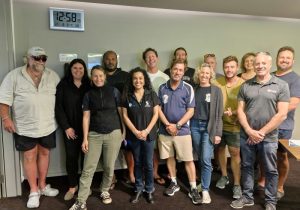In August, Cook Island Aquatic Reserve celebrated a major milestone with the signing of the Tour Operators’ Code of Conduct.

All ten tour operators who take snorkelling and scuba diving trips to Cook Island Aquatic Reserve have worked over the last year with the Department of Primary Industries and Regional Development (DPIRD) Fisheries and the National Parks & Wildlife Service to create a practical Code of Conduct.
The goal is to conserve the incredible ecosystem of the reserve while supporting sustainable tourism.
Located just 600 metres offshore, the Cook Island Aquatic Reserve is renowned for its vibrant marine life including turtles, colourful corals, and a diverse range of fish and invertebrates.
“The Code of Conduct is designed to help tour operators and visitors experience the reserve sustainably, outlining the rules for the aquatic reserve and best practice advice,” said Lesley Diver, Senior Manager, Marine Planning, DPIRD Fisheries.
The reserve features two zones: the inner zone around the island is a no-take area, while the outer zone allows some fishing.
Peter Comerford from Tweed Seasports said the inner zone, with its rich marine biodiversity, is a popular spot for snorkelling, diving and underwater photography.
“Tourists are always blown away by the beautiful underwater world they encounter,” he said.
However, some visitors are unaware of the potential harm they can cause.
“Some people don’t realise that marine habitats can be damaged by touch, standing, or from their fins or loose equipment, or that getting too close, or pursuing marine animals can cause stress and force them to leave the site,” Mr Comerford said.
Education is key.
As part of the Code, tour operators will deliver a comprehensive pre-dive briefing to educate all their clients on how to properly respect and care for marine life.
“This initiative aims to help reduce harmful incidents and protect the variety of marine life for current and future generations,” Ms Diver added.
Kristie Morgan from Kirra Dive emphasised the need for broader support.
“To safeguard this incredible biodiversity hotspot, we need the support of the local community. While tour operators are committed to this cause, encouraging private visitors to actively protect our marine life is the next important step.”
How can you help protect all marine life at Cook Island Aquatic Reserve?
Some key tips to ensure you are helping protect this jewel in the crown of the Tweed Coast.
- Admire marine life with your eyes only—avoid touching, whether alive or dead (including shells).
- Maintain a respectful distance from marine animals; observe without pursuing, herding, obstructing their path or disturbing them.
- To help marine animals maintain their natural behaviours, do not feed them.
- Minimise flash and bright lights to help reduce stress on wildlife, especially at night.
How can you look after marine habitats in the reserve?
- Use only the moorings provided to protect corals, rocky reefs and seagrasses—anchoring damages these vital habitats.
- Enjoy Cook Island from a distance; do not land on Cook Island or stand on the surrounding reef.
- Avoid standing, walking or resting on rocks or marine life, or gripping them for support to prevent drift or when taking photographs, as this will cause damage.
- Be careful where you put your fins and secure loose equipment (e.g. cameras, gauges, torches).
- Choose eco-friendly sunscreen and reduce its use by covering up.
For more information on the reserve and management rules visit Cook Island Aquatic Reserve.







